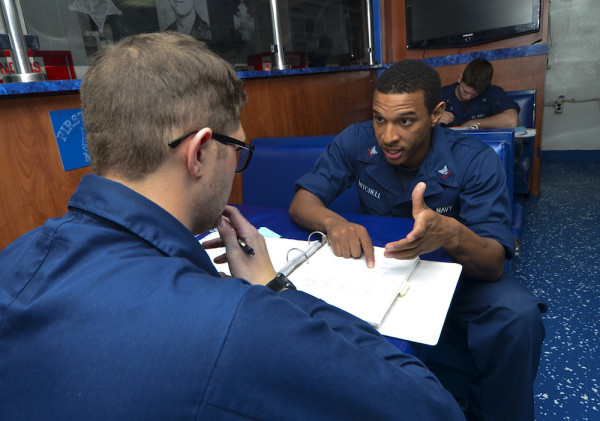

As a veteran, your background is an important part of why you should be hired. Have an interview coming up and aren’t sure what you should say? Here’s a list of things absolutely every veteran should mention in every interview, no matter what.
1. Your military service.
One of the biggest mistakes you can make as a veteran is not saying enough positive things about your military service.
This one fact about you sets you apart more than almost anything else.
But unfortunately, one thing that’s almost universal amongst veterans: We’re a humble breed. You’ve got to get over that.
How to improve: Just mention you’re a veteran. Mention what you did. It could be enormously beneficial, especially if someone on the interviewing panel is also a veteran and shares that frame of reference with you.
Related: How to play up your military strength in a civilian interview »
The American public has consistently ranked the military as the most valued segment of society — higher than any other group including teachers, doctors, scientists, and artists. You are automatically in the cool-kid club.
So, don’t be afraid to be proud. Wear a small lapel pin honoring your branch of service to the interview. You want your military service to come up. Important companies want to hire veterans, so don’t miss an opportunity to show what sets you apart.
2. Your occupational experience.
No matter what you did in the military, you completed some of the best vocational training before you started your career, and spent years becoming an expert in what you do.
Your career is documented through performance evaluations, awards, certifications, and all kinds of other flashy trinkets you earned in uniform. Use that to your advantage, especially when it’s exceptionally relevant to the position.
How to improve: You have to learn how to make your experience and military training make sense to the interviewers. Your Verification of Military Experience & Training documents can help as they basically do the job for you — if you haven’t looked, you should. This system takes every school you’ve ever completed, your rank and occupation at the time of separation, and then translates what the hell that means into civilian jargon. That’s a good starting point for defining your military experience when talking to civilians and identifying your skill sets (but should not define your career aspirations after the military). No matter what, you’re going to have to cut way back on the military slang to sound relevant in interviews.
You may even want to consider taking a class or two, like public speaking or interpersonal communication. It will make you a better communicator and help you break the jargon habit, both of which could be a huge help in getting the job you want.
That said, you shouldn’t be afraid to pick up a little civilian-industry lingo for the career. That doesn’t mean work slang should be every other word out of your mouth, but knowing the terminology can help you be comfortable in the interview.
3. Your intangibles.
Whether you’ve deployed and led men and women in combat or spent most of your career in garrison, you have had unique experiences and developed intangible skills like discipline, self-reliance, leadership, teamwork, communication, and adaptability that are highly sought in almost any workplace.
How to improve: You can use the STAR interview method to best capture those intangibles. On your resume and in your interview, you should use specific examples of situations you encountered, and how those intangible skills helped you to overcome them. When necessary, cite documents (especially awards) that back up what you’re saying.
4. Your resume.
You’ve got a couple of sheets of paper and a 20-to-30 minute conversation or two, and that’s it. That’s all that your prospective employer has to judge you against all the other applicants.
You should focus on telling as complete a story as possible on what makes you special, with your resume and interview reinforcing each other to paint a cohesive picture of who you are and why you are the most qualified candidate for the job you’re applying for.
How to improve: You should be tailoring your interview for every job you apply for, and you should also be prepping for every interview based on the specific resume you submitted for that job. Make sure that during your practice interview (you are practicing before the real thing, right?) you’re using your resume as a resource. Ask your practice interviewer to give you feedback based on how consistent you are.
With that in mind, you should come up with a couple of stories based on your service and practice sharing them so you are comfortable telling them.